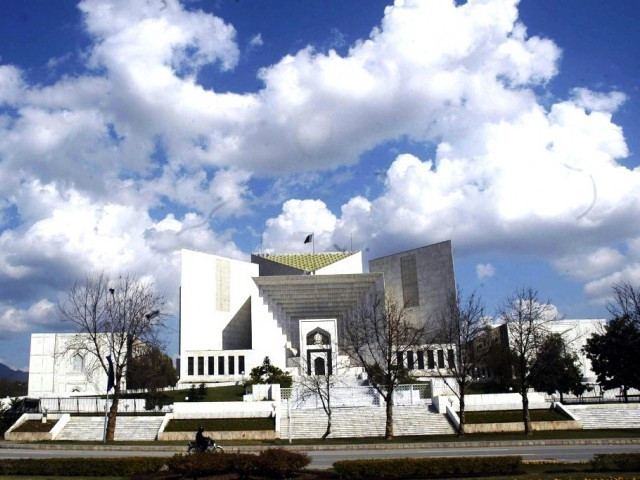Fundamental right: Court seeks proposals on housing for homeless
Asks town planner to submit plan in two weeks

Supreme Court. PHOTO: EXPRESS/FILE
The Supreme Court has sought proposals for ensuring provision of shelter, one of the fundamental rights enshrined in the Constitution, to the homeless people in the federal capital.
A three-judge bench of the apex court, headed by Chief Justice Jawwad S Khawaja on Monday, directed the law and justice commission’s secretary to convene a meeting with the representatives of different federal government departments, provincial law officers, veteran constitutional expert Abid Hassan Minto and submit proposals regarding enforcement of articles 9, 14 and 25 read with Article 38-D of the Constitution.
The proposals should be realistic by ensuring constitutional obligations under Article 5 of the Constitution.
The court is hearing a constitutional petition filed by affected dwellers of the I-11 katchi abadi and activists of the Awami Workers Party (AWP) against demolition of katchi abadis by the Capital Development Authority (CDA).
The bench maintained its earlier order, wherein the CDA was restrained from taking any action against the katchi abadis.
It also sought assistance of Tasneem Siddiqui, an acclaimed town planner and expert on the affairs of katchi abadis, who has worked on low-income housing in Sindh.
The court gave Siddiqui two weeks to submit proposals on a policy for providing alternative housing to katchi abadi residents.
It also asked the civic authority and the attorney-general of Pakistan to provide Siddiqui an office and other facilities to complete the task.
The also bench asked CDA to treat all citizens living in Islamabad equally.
Justice Qazi Faez Isa said how come persons who picked up sticks and stones out of frustration could be considered as terrorists?
Another member of the bench, Justice Dost Muhammad Khan, asked whether law enforcement agencies recovered any explosives from the I-11 slum?
The chief justice observed that CDA had not taken any action against those who had constructed palaces, marriage halls and boutiques at their agro farms instead of growing vegetables.
He remarked that there should be no selective treatment.
The CDA and the Islamabad Police on July 30, 2015 launched an operation in I-11 to clear the slum.
Justice Dost Muhammad said all political parties in their manifestos have committed to providing shelter to the poor, but were not taking any practical steps in that regard.
He asked was the I-11 katchi abadi established overnight?
The chief justice said that people in the I-11 slum had been living there for the nearly three decades.
A CDA official informed the court that they had facilitated the slum residents and provided them with transport.
The chief justice also asked: “I am curious and just wanted to know where the people were shifted?”
Justice Dost Muhammad asked the CDA counsel whether they had a record of how many babies, children, teenagers and women were living in the katchi abadi.
The court was informed that 5,000 persons [from the slum] were on the electoral rolls and had polled votes in the past three to four general elections.
According to a report of State Bank of Pakistan, the country is facing shortage of nine million housing units.
Published in The Express Tribune, September 1st, 2015.



















COMMENTS
Comments are moderated and generally will be posted if they are on-topic and not abusive.
For more information, please see our Comments FAQ